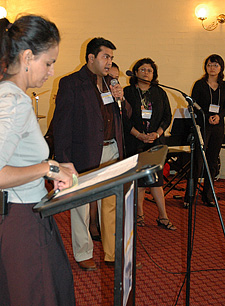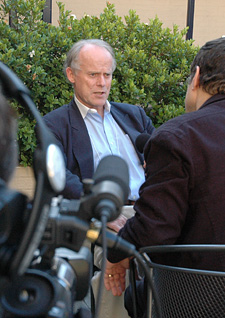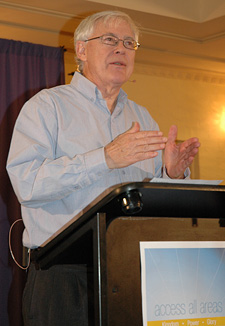Three days prior to the Access All Areas conference, Promise Hsu was standing amidst the crumbling villages of China's Sichuan province wondering what a Christian was to make of the devastation before him.
"I witnessed an almost 10-hour rescue effort to pull a man from a collapsed building," he recalls.
"In the end, the man was rescued but had to have both legs amputated. Two hours after he was pulled from the collapsed building, he died. His wife had died before him."
"When you saw what was happening with your own eyes, it was very striking," Promise says.
His presence in the air-conditioned conference venue is a reminder that journalists are only ever a telephone call from the world's worst tragedies, places where the Christian faith must demonstrate its relevance or suffer a similar fate.
"I began to think that comfort is one of the important things for the survivors and as a Christian, I thought that the real comfort is through God, not from man," Promise says.
He told delegates to the conference that one of the biggest things the disaster achieved was to encourage people to think deeply about the meaning of death " a topic normally as taboo in China as it is in the West.
In his full interview he foresees a crucial opening for Chinese and foreign Christians through compassion when the world's attention shifts back to the Beijing Olympics.
"Government officials, international and national organisations and also the media will go eventually " they can't stay forever. At that time I think the survivors will face a critical moment because they will feel alone, abandoned by the world. So there is the opportunity for mission, for other Christians to dedicate themselves to the survivors."
Access All Areas reaches global benchmark
Access All Areas, a conference jointly produced Christians in the Media and the Oxford Centre for Religion and Public Life, this year established its global credentials.
 Its second conference has been attended by over 100 media workers from across Australia and the world, including 25 from China, Indonesia, South Korea, Malaysia, the Philippines and the USA.
Its second conference has been attended by over 100 media workers from across Australia and the world, including 25 from China, Indonesia, South Korea, Malaysia, the Philippines and the USA.
The goal is to make the conference a biannual event to allow the inclusion of top-level Christian/media spokespeople.
The first conference heard Prime Minister Kevin Rudd (the then opposition spokesman for foreign affairs) propose his "best mix' for Christianity, politics and the media.
This year the managing director of the ABC, Mark Scott, reflected on his own "garden variety' Christianity, while giving delegates a vision of the direction in which he will be steering the national broadcaster.
Truth and compassion key to witness
Mr Scott says he has always aimed to show Christ-like credibility to his colleagues, whether professionally or personally.
"Be one of those people who talk relatively little but act big," he advised his audience.
He said an internet blogger once described him as "God's secret agent in the ABC'.
However he was quick to add that if it was a fair description, then "I'm more like Maxwell Smart than James Bond. And often I find myself saying things to the effect of "Sorry about that chief" '"
He is far less apologetic, though, about the direction the ABC must take.
"Part of the challenge for the ABC is rather than broadcast at an audience, to host the conversation with the audience," Mr Scott says.
In his key-note address Mr Scott says the ABC will work to deliver new digital and internet-based platforms that will recognise a fundamental shift in the Australian media.
"All the power is moving from the media proprietors to the audience," he says. "We live in an era where everyone can communicate to everyone."
Mr Scott outlined the ABC's plans to make the most of technological advances he believes will create a market of as many as 50 free-to-air and pay-television channels.
He also outlined the ABC's commitment to shouldering the burden of providing more quality Australian drama and children's television, as well as more interactive news formats.
Aunty has recently launched Q&A which allows viewers to text in their questions for guests.
Asked what the ABC's plans were for religious programming, Mr Scott held up Compass as a success story, but stopped short of committing the ABC to any increase in faith-based content.
"Part of the answer is more programming, but part of it is also making it more available to watch at a time and in a way [viewers] want to watch it," he says.
Technology cannot trump values
Many speakers, including Mr Scott, agreed the media's technological revolution would not remedy the fundamental problems with current reporting on Christian stories, or provide solutions to the key challenges facing Christian journalists.
Mr Scott believes the secular media would "rather cover religion than faith'.
"Many times journalists find dealing with faith to be so difficult that issues are framed as if they were struggles with power," he says.
The Rev Dr Arne Fjeldstad, the director of the Oxford Centre for Religion & Public Life encouraged listeners to remedy this problem from within by deliberately using "faith' to inform their stories.
"When you do an assignment, ask what faith, what values, what religion does the person I am going to speak to have, and does it have a relevance to this issue?"
 David Aikman, veteran journalist, and former bureau chief for Time Magazine believes the merely moral reporter, inspired to "clean up city hall', has little future in journalism.
David Aikman, veteran journalist, and former bureau chief for Time Magazine believes the merely moral reporter, inspired to "clean up city hall', has little future in journalism.
"The problem with this motivation is, if you are not a Christian, you are very quickly transformed from an idealist to a cynic," Mr Aikman explains.
Inevitable lies and disappointments lead to a sense of outrage and violation in many, resulting in the conclusion that no-one can be trusted.
"A cynical journalist is not a very good journalist [but] Christians have a huge advantage because they know human nature is flawed and are not particularly surprised," Mr Aikman says, encouraging his listeners to take their biblical worldview to work.
Glenn Daniel, group news director for the Australian Radio Network, also cautioned journalists against attempting to quarantine their faith from their profession.
"Because we follow Christ we immediately divide people in an industry that is devoted to objectivity," he said in an address titled "Finding the balance'.
The faithful Christian journalist, he said, will learn to report news without promoting worldviews they are fundamentally opposed to.
Glory not with glittering prizes
 Archbishop Peter Jensen who presented the closing key-note address, called on journalists to remember the true source of glory.
Archbishop Peter Jensen who presented the closing key-note address, called on journalists to remember the true source of glory.
"We try and make a name for ourselves that we might gain the glittering prizes," he said, reflecting on how linked recognition has become to identity in the western world. "But we cannot get glory for ourselves, for glory is a gift."
Archbishop Jensen pointed out that it was God who promised Abram "I will make your name great' if he would trust in His promises.
"He lived within the culture but he looked beyond the culture for the approval that came from God himself," he said.
"You will be manipulated and make a mess of things if you trust in the verdict of the world on your life. Whose verdict is really going to matter to you?"
A range of addresses and other media rich resources from the conference are available at the Access All Areas web site.

























